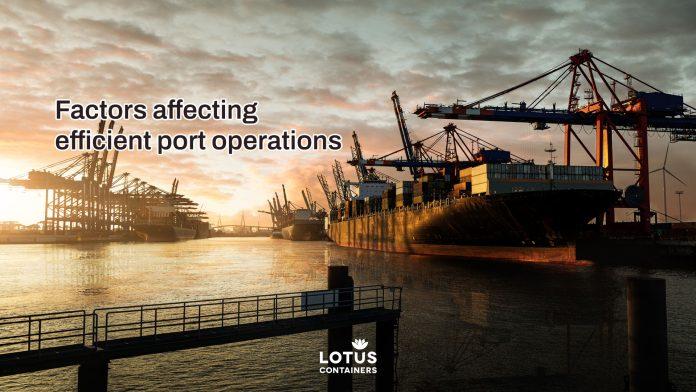The logistics industry relies on a global network of ports and sea trade to transport cargo containers overseas. As a result, it is crucial to ensure that port operations are carried out systematically and smoothly. Efficient port operations not only enhance productivity but also increase profit margins in trade. However, ports face numerous challenges that hinder their ability to perform their tasks effectively. In this article, we will explore the various factors that can impede the functioning of ports.
Seaport and its importance
Ports are artificial harbour constructions on the seaside to facilitate marine operations. Sea vessels such as ships, cruises, and boats load and unload cargo or passengers at the ports. It is the hub that initiates the transportation of goods via sea, directs the flow of information and data among ports and shippers, and directly impacts the supply chain. Ports help in boosting the economy by fulfilling the demands of the supply chain. They are responsible for carrying out the logistics and transportation processes seamlessly.
What are the determinants of port performance and efficiency?
Efficient and well-maintained ports are essential for profitable trade operations for both customers and stakeholders.
- To ensure smooth cargo loading and unloading, maintenance and repairs, and transportation of goods from the port to the quay, ports should have a surplus of equipment.
- A highly skilled labor force is also necessary to handle technology, equipment, and goods safely and efficiently.
- Effective port management systems are critical in ensuring systematic and seamless management of ports, monitoring and regulating various port operations, facilitating the flow of information, distributing port traffic, and managing port work.
- Well-designed ports that include a well-built harbor, container terminal, and container depot contribute significantly to their smooth functioning.
- Moreover, ports should follow safety provisions, and adequate safety aids must be available in case of worker mishaps.
Factors affecting port operations
Ports load and unload numerous shipping containers daily. It takes extensive management to accommodate these entering cargo containers, maintain track of their servicing and repairs, and provide clearances to outgoing containers. Ports face many challenges which affect the efficiency of port operations.
- Weather conditions – Thunder, storms, turbulence, and high tides delay the ship’s arrival at the ports, leading to congestion. These weather conditions also restrict the manual handling of cargo, and a lot of time is lost.
- Equipment malfunction might lead to many seaport hazards and risks if the shipping container falls or slips. Automated shipping terminals run the risk of technical failures leading to delays in shipment from the port to the yard.
- Lack of skilled workforce- Ports are adapting technology to make ports’ operations seamless and more manageable, but ports’ inefficiency has still been noted. There is a need for more skilled labourers who can handle technologically empowered equipment carefully and correctly.
- Port congestion– Delay in providing berthing space for sea vessels leads to congestion and losses to the sender, receiver, shipping lines, and the overall supply chain.
- Hazards and risks at seaport– Most shipping ports manually carry out port operations. In such cases, multiple factors threaten the life of labourers and damage to cargo during cargo handling. The risks include slippage or tripping of cargo containers, working in poorly ventilated spaces, and mishaps while handling hazardous cargo causing fatalities or severe injuries to workers.
Systematic management of port operations increases port efficiency and offers greater profits. The various factors affecting efficient port operations are the hindrances that need attention to raise port standards.
LOTUS Containers have a global network with 300+ container depots to enable the smooth transport of shipping containers. We deal with buying, selling, and leasing shipping containers.
